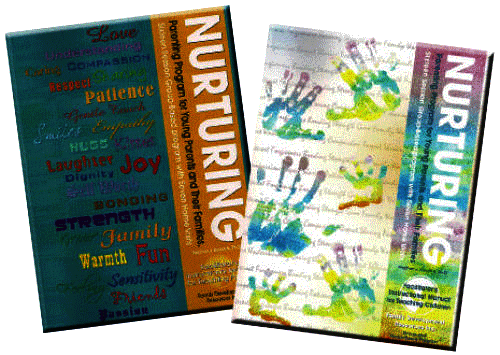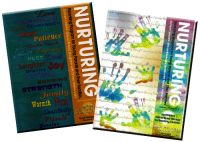

The Nurturing Program for Young Parents and Their Families is referred to as a competency-based program. Each lesson has identified competencies the parents need to learn in order for their parenting practices to improve. Parents attend 16 group sessions each lasting 2 1/2 hours. Families can also receive individual home/parent sessions between the group sessions to ensure the knowledge and skills presented in the group sessions are being implemented in home.
The Nurturing Program for Young Parents and Their Families is referred to as a competency-based program. Each lesson has identified competencies the parents need to learn in order for their parenting practices to improve.
The lesson competencies keep both the parent and the parent educator on track to make sure competencies are being learned and understood.
The individual lessons, assessments, evaluations and home practice assignments are all designed to promote learning. In this Nurturing Program for Young Parents, families are involved in group-based and home-based sessions to ensure that learning is occurring.
Parents and their children meet concurrently in their separate groups that run 2 ½ hours for 16 consecutive weeks. Additionally, families receive seven individual home/parent sessions each 60 to 90 minutes in length (children must be present for individual home/parent sessions).
Young Parents Easy Reader was developed to make nurturing parenting easy to understand and practice. The practices presented in the Easy Reader have been proven over the years to work in raising healthy and caring kids. However, just like all practices that are meaningful, there are no quick fixes or short cuts, and no “technique” can substitute for a close and meaningful parent-child relationship.
The lessons in the Easy Reader address several major concepts:
1. Nurturing as a Philosophy.
Presented are the basic foundations of nurturing as a philosophy of parenting, as well as a philosophy of life.
2. Childhood Growth and Development.
A nurturing parent understands the importance of having appropriate developmental expectations of their children. Children need to experience success to improve their self-worth.
3. Discipline with Dignity.
Dignity means to treat another person honorably. Teaching and guiding children to be cooperative and contributing members of a family requires parents to behave dignified.
4. Empathy.
The ability to be aware of, understand and respond appropriately to your children is the key in being a nurturing parent.
5. Managing Feelings.
Recognizing and managing feelings is a basic quality of nurturing parenting.
6. Communication.
Often identified as the major problem between parents and children, we address positive communication skills.
7. Self-Worth and Empowerment.
A positive self-worth is the foundation for treating others with respect and value. Teaching children to use their Personal Power in positive ways contributes to their overall positive Self-Worth as well as a positive and healthy Sexual Self-Worth.
8. Making Good Choices and Keeping Kids Safe.
Smoking, drugs and alcohol use, sex, peer pressure are all issues that confront families daily.
9. Nurturing Routines.
Children excel when their environment is predictable and nurturing.

